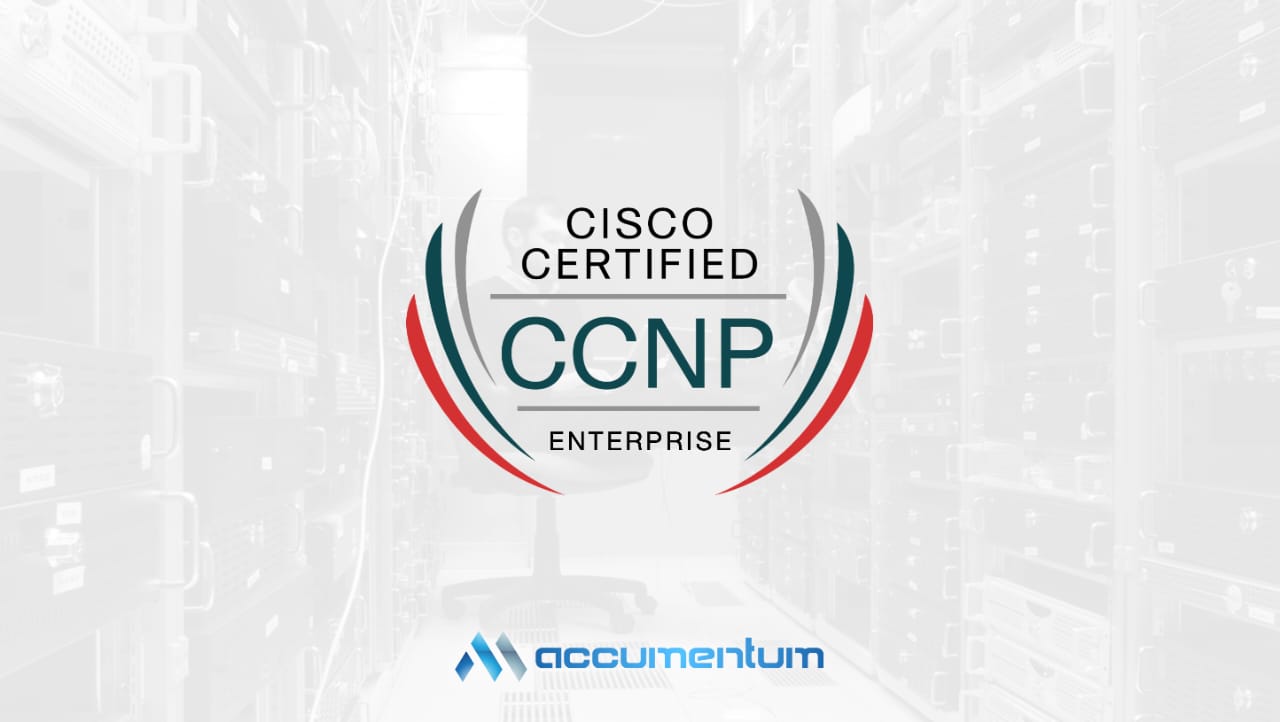Cisco CCNP Enterprise Certification Training Course
Course Overview
The Cisco Certified Network Professional (CCNP) Enterprise Certification Training Course with Accumentum is tailored for seasoned network professionals aiming to deepen their expertise in managing complex enterprise networks. This advanced course encompasses a comprehensive curriculum that covers dual-stack architecture, virtualization, infrastructure, network assurance, security, and automation. Participants will master the intricacies of enterprise networking through hands-on labs that simulate real-world scenarios, preparing them for both the ENCOR (Implementing and Operating Cisco Enterprise Network Core Technologies) core exam and one of several concentration exams, such as ENARSI (Implementing Cisco Enterprise Advanced Routing and Services) or ENAUTO (Automating and Programming Cisco Enterprise Solutions). This training not only equips you with the skills to configure, troubleshoot, and secure enterprise networks but also ensures you’re ready to tackle the evolving challenges of modern networking environments.

Course Objectives
- Gain advanced knowledge in implementing and operating Cisco’s core technologies for enterprise networks, including dual-stack (IPv4/IPv6), virtualization, and infrastructure.
- Learn to secure enterprise networks effectively, implement network assurance solutions, and troubleshoot using advanced tools and methodologies.
- Develop skills in automating network tasks with tools like Python, REST APIs, and Cisco’s DNA Center, enhancing network operation efficiency and scalability.
- Focus on one or more concentration areas such as advanced routing (ENARSI), network design (ENSLD), or automation (ENAUTO), to customize your professional skill set according to industry demands.
Who Should Attend
- Professionals looking to deepen their expertise and validate their skills in complex enterprise network environments.
- Individuals involved in planning, designing, and optimizing enterprise networks who seek certification to affirm their advanced capabilities.
- Those managing network teams or infrastructure who need to stay ahead of evolving network technologies and practices.
- Anyone with a CCNA or equivalent experience aiming to move into higher-level roles in network engineering, security, or automation within an enterprise setting.
Prerequisites
- A solid foundation in network fundamentals, equivalent to the CCNA level, is essential for understanding the advanced concepts covered in the CCNP curriculum.
- At least one to three years of experience in network installation, configuration, operation, and troubleshooting to grasp the practical applications of the technologies discussed.
- Hands-on experience or theoretical knowledge of working with Cisco’s operating systems to handle the configuration and management tasks in the course.
- A grasp of fundamental security principles and rudimentary scripting or automation concepts to leverage the advanced topics in network security and automation.
Course Content
- Implementing and managing IPv4 and IPv6 coexistence.
- Configuring dual-stack interfaces on Cisco devices.
- Troubleshooting IP address conflicts and routing issues.
- Understanding NAT64 and DNS64 for IPv6 transition.
- Strategies for migrating from IPv4 to IPv6.
- Basics of network virtualization and VRF (Virtual Routing and Forwarding).
- Implementing L2 and L3 VPNs using MPLS.
- Configuring and troubleshooting VXLAN for overlay networks.
- Understanding and deploying Cisco’s SD-Access for campus networks.
- Virtual network services like firewalls and load balancers.
- Advanced switch and router configurations for enterprise environments.
- High availability and redundancy techniques (HSRP, VRRP, GLBP).
- QoS implementation for traffic management.
- Spanning Tree Protocol enhancements (RPVST+, MST).
- VLAN and trunking configurations for large-scale networks.
- Using DNA Center for network assurance and insights.
- Implementing network telemetry for proactive monitoring.
- Troubleshooting with Cisco’s diagnostic tools and methodologies.
- Network health checks and performance optimization.
- Log analysis for network behavior and anomaly detection.
- Implementing and managing Cisco TrustSec.
- Configuring advanced ACLs and security features like CoPP.
- Understanding and deploying SGT (Security Group Tags).
- Threat defense with Firepower Threat Defense (FTD).
- Securing wireless networks with 802.1X and WPA3.
- Introduction to YANG models and NETCONF for configuration management.
- Python scripting for network automation tasks.
- REST API usage for network programmability.
- Cisco DNA Center for network automation and orchestration.
- Ansible playbooks for network device management.
- OSPF multi-area configurations and route optimization.
- EIGRP stub routing and named mode configurations.
- BGP for enterprise use, including route reflectors and confederations.
- Policy-based routing and route redistribution techniques.
- Troubleshooting complex routing scenarios.
- Designing scalable network topologies for enterprise growth.
- Implementing hierarchical network models (Core, Distribution, Access).
- Network segmentation and micro-segmentation strategies.
- Design principles for WAN, including SD-WAN solutions.
- Capacity planning and performance considerations.
- Advanced configuration of Cisco Wireless LAN Controllers.
- Implementing and securing wireless mesh networks.
- High-density wireless design for large environments.
- FlexConnect for branch office deployments.
- Wireless Quality of Service (QoS) and location-based services.
- Systematic approach to diagnosing network issues.
- Tools like Wireshark, NetFlow, and Syslog for network analysis.
- Troubleshooting IP services like DHCP, DNS, and NTP.
- Resolving complex VPN and WAN connectivity problems.
- Strategies for troubleshooting in multi-vendor environments.
Course Features
Interactive Learning
Participate in training sessions, discussions, and hands-on labs with experienced instructors.
Comprehensive Study Materials
Access extensive resources, including e-books, video lectures, and practice exams.
Practical Scenarios
Engage in real-world exercises and case studies to apply advanced networking concepts.
Certification Preparation
Receive guidance and tips to successfully pass the Cisco CCNP Enterprise certification exams.
Certification Exam
Upon completing the course, you will be fully prepared to take the Cisco Certified Network Professional (CCNP) Enterprise Certification Exams, including both the core exam and one of the concentration exams in areas like advanced routing (ENARSI), network design (ENSLD), or automation (ENAUTO). Earning this certification validates your advanced expertise in enterprise network technologies, security, automation, and complex troubleshooting, demonstrating your capability to design, implement, and manage sophisticated network solutions using Cisco technologies. This achievement will significantly enhance your career prospects in senior network engineering, architecture, and operations roles.
Enrollment
Join the Cisco Certified Network Professional (CCNP) Enterprise Certification Training Course at Accumentum to advance your journey toward becoming a certified network professional at an expert level. For more details and to enroll, visit Accumentum’s registration page linked below.
